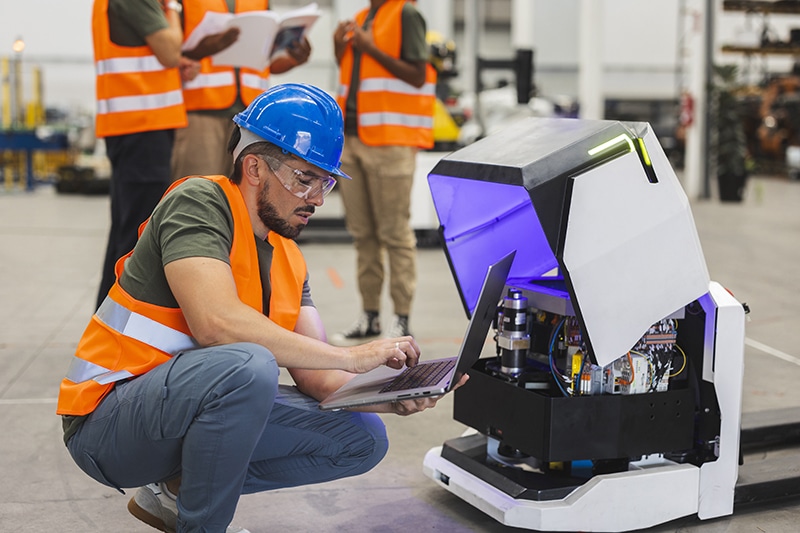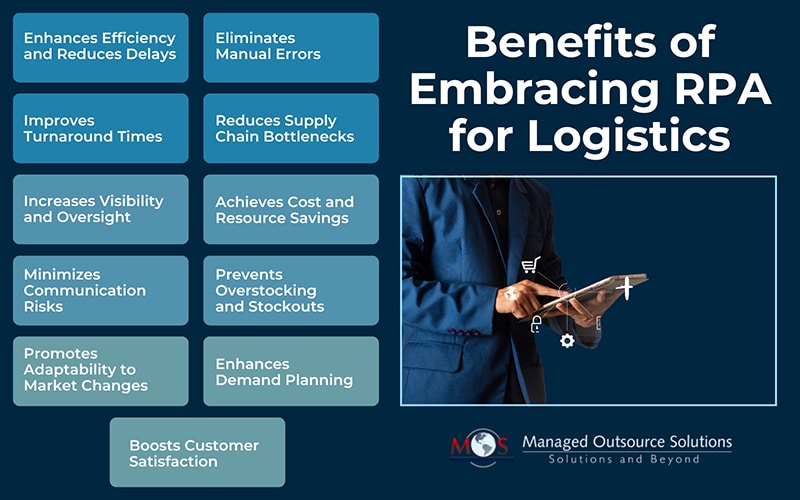Managing the flow of goods, data, and finances from raw materials to the end customer or supply chain management is an intricate process. Varying legacy systems, multiple data inputs, and manual processes make things even more complex, leading to errors, delays, inefficiencies, and increased costs. Robotic process automation (RPA) is simplifying supply chain management by automating monotonous and time-consuming tasks. With end-to-end RPA solutions, businesses can optimize logistics and stay competitive in ecommerce landscapes.
How RPA is Transforming Supply Chain Management
RPA uses smart bots to handle monotonous tasks. By leveraging artificial intelligence and machine learning, this software technology streamlines repetitive and manual supply chain management tasks. With robotic process automation consulting, organizations can reduce the need for manual intervention and increase supply chain efficiency in the following areas:
Streamlines Order Processing
RPA automates data entry in supply chain management, optimizing order processing and reducing manual effort for faster, more accurate handling. When a customer initiates an order, RPA captures and validates the order details, including products, quantities, shipping address, and payment method. The bots can automatically generate shipping labels based on order details, update order statuses, and send notifications to customers about their order progress. Automated processes lead to faster and accurate order processing and shipping, resulting in quicker delivery times and happier customers.
Enhances Inventory Management
Manual processes can cause errors in inventory management, resulting in overstocking, understocking, and increased storage costs. Managing inventory effectively requires real-time tracking and forecasting. RPA bots can monitor inventory levels, analyze demand patterns, and automatically reorder stock when necessary. Bots compare stock levels across different systems, such as warehouse management systems (WMS), point-of-sale (POS) terminals, and supplier databases, identifying discrepancies. If an item is running low, RPA automatically triggers alerts, generates purchase orders, and sends them to suppliers, reducing the risk of stockouts.
Streamlines Procurement and Vendor Management
The procurement department handles massive amounts of data and documentation. Processes involve multiple approvals, supplier communications, and document processing, all of which can benefit immensely from automation. RPA automates purchase order generation and invoice processing, enhancing procurement efficiency.
Automation of data collection, document verification, and compliance checks speeds up the onboarding of new suppliers. RPA bots can extract data from contracts, compare prices, and check compliance with procurement policies. They also automate sending requests for quotations (RFQs) and analyzing supplier responses, enabling quicker decision-making. By minimizing manual tasks and delays, businesses can improve vendor relationships and negotiate better terms. By automating vendor performance monitoring, RPA helps evaluate supplier reliability, identify risks, and ensure service-level agreements (SLAs) are consistently met, maintaining quality and compliance in the supply chain.
Optimizes Logistics and Shipment Tracking
Shipping and logistics involve multiple carriers, tracking systems, and documentation. RPA optimizes logistics and shipment tracking by automating repetitive tasks such as data entry, order processing, and status updates. RPA bots can seamlessly integrate with existing logistics management systems to extract real-time data from various sources, update records, and notify stakeholders about potential delays. Accurate tracking of shipments throughout the supply chain improves visibility, decision making, and coordination across the supply chain. This not only improves operational efficiency but also enhances customer satisfaction by providing timely updates and reliable delivery estimates.
Improves Demand Forecasting and Analytics
Accurate demand forecasting is essential for effective supply chain planning as it enables businesses to anticipate customer needs, manage inventory levels, and optimize resource allocation. RPA applications in demand forecasting for supply chains automate data collection from different sources, analyzes trends, and generates predictive insights. This allows for better coordination between suppliers and manufacturers, reducing excess inventory, minimizing stockouts, and improving alignment with market trends.
Reduces Compliance Risks and Enhances Security
Supply chain operations must adhere to various regulatory requirements, which can be complex and time-consuming. RPA helps ensure compliance by automating tasks such as document verification and transaction auditing. RPA can quickly check that all necessary documents are in order and that transactions align with regulations. The system can flag any discrepancies, alerting teams to potential issues before they escalate. This proactive approach significantly reduces the risks of regulatory non-compliance and fraud, helping businesses maintain their integrity and avoid costly penalties.
Real-World Example: Amazon’s Use of RPA in Supply Chain Management
Amazon is a great example of how RPA optimizes supply chain management. The ecommerce giant leverages RPA to streamline multiple aspects of its supply chain. RPA bots automatically process orders, validate payment details, and assign shipments to the most efficient fulfilment centers.
Integration of RPA with AI-powered systems allows for real-time monitoring of stock levels. By analyzing demand trends and initiating automatic reordering, the bots ensure that warehouses are never overstocked or understocked.
Sorting, packaging, and shipment labelling processes are automated, speeding up order delivery. RPA bots in logistics communicate with logistics partners and track shipments across multiple carriers, enhancing efficiency and visibility. Customers receive real-time updates on their deliveries, improving transparency and customer satisfaction. Amazon’s automated systems process return requests, validate refund eligibility, and update inventory records, minimizing manual intervention.
By incorporating RPA with AI and machine learning, Amazon has developed one of the most efficient and scalable supply chain operations globally.
Transform Supply Chain Management with RPA Experts
By automating repetitive tasks, enhancing accuracy, and ensuring compliance, RPA in supply chain is transforming logistics operations for businesses around the globe. As companies seek to stay competitive in an ever-evolving marketplace, partnering with a leading RPA company can provide the tools and expertise necessary to stay ahead. By reducing manual interventions in supply chain management, RPA minimizes errors, cuts operational costs, and accelerates process execution, allowing focus on strategic tasks and enhancing productivity.
Automate your business operations with our cutting-edge RPA solutions?





